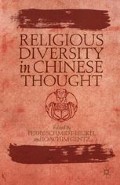Abstract
In China, the academic study of religions began in the early twentieth century. Before 1949, Chinese scholars had translated and published various works of religions; however, only a few works had a great influence on later generations. After 1949, the study of religions was put on hold until 1978. Today, the Chinese study of religions lags far behind that of the Western world. Only recently has the question of whether China needs a pluralist theory of religion become a matter of dispute in Chinese academic circles.
Access this chapter
Tax calculation will be finalised at checkout
Purchases are for personal use only
Preview
Unable to display preview. Download preview PDF.
Notes
Duan Dezhi (段德智), “‘The National Warfare’ on the ‘Theory of Religion as Opium’ and Its Academic Contribution” <关于 “教鸦片论” 的 “南北战争” 及其 学术贡献>, in Fudan Journal (Philosophy and Social Sciences) 《复旦学报》 (社会科学版) 5 (2008): 84–89. For an introduction in German, see
Joachim Gentz, “Religionskritik im Wandel der Orthodoxie. Vom Dritten Opiumkrieg und vom Aberglauben in China,” in Religion und Kritik in der Moderne, ed. Ulrich Berner und Johannes Quack (Berlin: Lit Verlag, 2012), 55–81.
Duan Dezhi (段德智), “Philosophical Debates of Religion over the Past 30 Years and Its Academic Achievements in Chinese Mainland,” <中国大 陆 近 30 年来的 宗教哲学之争及其学术 贡献>, in Wuhan University Journal (Humanity Sciences 《武 汉大学学报》), vol. 62, no. 1 (2009): 18.
During the past ten years, the debate on whether Confucianism is a religion or not has continued, but its focus has moved to the issues of how Confucianism influenced the development of China, personal identity, and the relationship among Confucianism and other religions. See Jiang Qing, Political Confucianism 《政治儒学》 (Shanghai: Shanghai Joint Publishing Co., 2003);
Jiang Qing and Sheng Hong, Toward Peace to Peace, 《以善致善》 (Shanghai: Shanghai Joint Publishing Co., 2004);
Ding Chunsong (丁春松), Institutional Confucianism 《制度儒学》 (Shanghai: Shanghai Joint Publishing Co., 2006);
Ding Chunsong, Confucianism. Religious Confucianism and China Institutional Resources 《儒 学、儒教与中国制度 资源》 (Nanchang: Jiangxi People’s Publishing House, 2010);
Peng Guoxiang (彭国翔), Confucianism Tradition: Between Religion and Humanism 《儒家 传统、宗教与人文主义之间》 (Beijing: Beijing University Publishing House, 2007);
Lu Guolong (卢国龙), ed., Studies on Confucianism 《儒教研究》 (Beijing: Beijing Social Science Academic Press, 2009).
Zhang Zhigang (张志刚), A Study on Philosophy of Religion 《宗教哲学研究》 (Beijing: China Renmin University Press, 2009), 325–443.
Wang Zhicheng (王志成), A Global Philosophy of Religion 《全球宗教哲学》 (Beijing: Religion and Culture Publishing House, 2005), 267–292. In addition, he translated many books by John Hick, Raimon Panikkar, Paul Knitter, and others into Chinese.
Ding Guangxun (丁光训), Selected Papers 《丁光训文集》 (Nanjing: Yilin Publishing House, 1998), 32.
Li Qiulin and Daniel H. N. Yeung, eds., Modernity, Transformation of Tradition and Sino-Christian Theology, Vol. 3 (Shanghai: East China Normal University Press, 2010), 644.
Zhuo Xinping, ed., Christianity (Beijing: National Publishing House, 2008), 18.
Jin Ze and Qiu Yonghui, eds., Blue Book of Religion (Beijing: Social Sciences Academic Press 2008), 138.
Paulos Huang, Sino-Christian Academic Theology: The Study of Christianity as an Academic Discipline (Beijing: Religion and Culture Publishing House, 2008), 82.
Ding Guangxun, “How Does a Christian Understand an Atheist?” in Ding Guangxun, Selected Papers (Nanjing: Yilin Publishing House, 1998), 138–145.
John Hick, An Interpretation of Religion (New Haven, CT: Yale University Press, 2004), chapter 14.
Hick is frequently cited by Chinese scholars. Some scholars in the church confirm Hick’s theory, and some scholars from the State Administration for Religious Affairs of the People’s Republic of China agree with Hick’s thoughts on pluralism. See also my article: Wang Zhicheng, “John Hick and Chinese Religious Studies,” in Religious Pluralism and the Modern World. An Ongoing Engagement with John Hick, ed. S. Sugirtharajah (New York: Palgrave Macmillan, 2012), 241–252.
Raimon Panikkar, Invisible Harmony, ed. James Cargas (Minneapolis: Fortress Press, 1995);
John Cobb, Jr., Transforming Christianity and the World, ed. Paul Knitter (Maryknoll: Orbis Books, 1999);
David Ray Griffin, ed., Deep Religious Pluralism (Knoxville, TN: Westminster John Knox Press, 2005).
Editor information
Editors and Affiliations
Copyright information
© 2013 Perry Schmidt-Leukel and Joachim Gentz
About this chapter
Cite this chapter
Zhicheng, W. (2013). Does China Need a Pluralist Theory of Religion?. In: Schmidt-Leukel, P., Gentz, J. (eds) Religious Diversity in Chinese Thought. Palgrave Macmillan, New York. https://doi.org/10.1057/9781137318503_15
Download citation
DOI: https://doi.org/10.1057/9781137318503_15
Publisher Name: Palgrave Macmillan, New York
Print ISBN: 978-1-349-46208-7
Online ISBN: 978-1-137-31850-3
eBook Packages: Palgrave Religion & Philosophy CollectionPhilosophy and Religion (R0)

